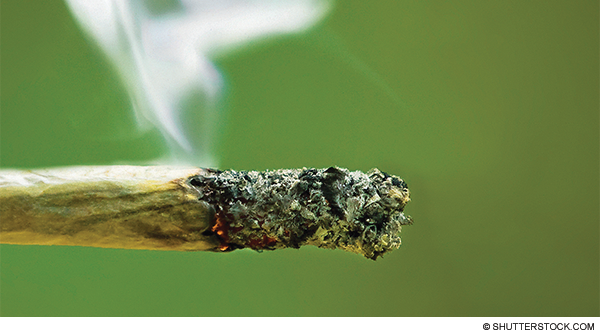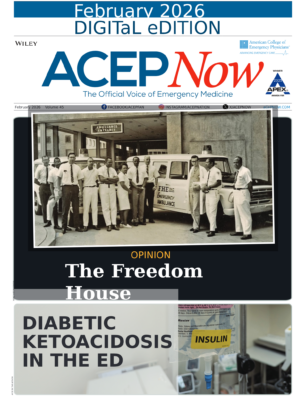
Colorado has had a long history with marijuana. It became one of the first states to allow medical marijuana in 2000. However, not until the fall of 2009 did we see a significant increase in dispensaries and marijuana card applications associated with the release of the Ogden Memo and laxity of federal enforcement of laws. In January 2014, Colorado became one of, now, two states that allow the sale, growth, and possession of recreational marijuana.
Explore This Issue
ACEP Now: Vol 33 – No 10 – October 2014After the increase in medical marijuana dispensaries and applications near the end of 2009, we noted a significant impact on our local tertiary adult and children’s emergency departments in Colorado. The most obvious effect for adults is that we are seeing more patients with marijuana intoxication. While a primary complaint of marijuana intoxication is still not common, we are now seeing it on a regular basis.
Calls to regional poison centers for unintentional pediatric exposures have increased in states with similar medical marijuana legislation.
In my [Dr. Heard’s] 15 years of working in our ED prior to legalization, I can recall, at most, two cases where marijuana intoxication was the primary complaint. We now see at least a case a week. Many of these cases are “tourists,” some of whom end up in our ED because they are too intoxicated to board their homebound flight. However, like ethanol, marijuana intoxication is usually not the primary complaint; these patients are seen for car crashes, injuries, or other common complaints. Another complication of frequent marijuana user is cannabinoid hyperemesis syndrome. When I first heard of this syndrome, I dismissed it as a poorly characterized non-disease that sounded interesting and made for a good case report. I now have a preferred treatment protocol that I use several times per week.
In my [Dr. Wang’s] pediatric emergency department, we are seeing an increasing number of accidental pediatric exposures. Most of these cases are young children who have ingested high-potency edible products and require hospital admissions. Further, national calls to regional poison centers for unintentional pediatric exposures have also increased in states with similar medical marijuana legislation. Since this initial increase from 2009 to 2011, visits to our children’s hospital have been steady at eight to 10 a year. However, within the first seven months of 2014, we have seen 13 emergency department visits for accidental ingestion of marijuana, again mostly due to edible products. What is surprising about these children is some of the severe symptoms they are developing. This year, seven of these children were admitted to the critical care unit, with two intubated for apnea and coma. With the use of cannabidiol for the treatment of seizures, we also have seen an influx of children with epilepsy moving to Colorado; they are sometimes seen in the emergency department for various ailments or breakthrough seizures. The effectiveness, drug interactions, and unwanted adverse effects of these oils and tinctures are unknown. The impact to the adolescent population has yet to be fully evaluated. Adolescents seen in local addiction clinics have been shown to have a high rate of use of diverted medical marijuana. Potential impacts of recreational marijuana include not only increased availability, resulting in ED visits for acute intoxicating effects of marijuana use, but also effects on mental health disorders and psychiatric-related illnesses. The impact on psychiatric services affects both adolescents and adults. As more studies suggest a link between cannabis use and psychiatric illness, the increased burden on a system that is already overwhelmed is worrisome.
In the first seven months of 2014, we have seen 13 emergency department visits for accidental ingestion of marijuana.
Decriminalization of marijuana has impacts on both the pediatric and adult emergency department population. As health care providers, we must be aware of signs and symptoms in all ages, along with use trends and patterns and the impact they will have on our health care system. The medical community should be actively involved in regulations. State legislators and health care providers must remain vigilant and follow the public health effects of such laws to determine best strategies and interventions (eg, child-resistant packaging, dose limitations, education, and counseling) for public health and safety.
Dr. Wang is assistant professor of pediatrics in the section of emergency medicine and medical toxicology at the University of Colorado Anschutz Medical Campus and Children’s Hospital Colorado in Aurora.
Dr. Heard is associate professor of emergency medicine at the University of Colorado Anschutz Medical Campus and University of Colorado Hospital.
Pages: 1 2 | Multi-Page






2 Responses to “How Legalizing Marijuana Has Impacted Colorado”
July 30, 2015
Colorado Rejects Medical Marijuana for PTSD Treatment - ACEP Now[…] July 15, Colorado health officials rejected a bid by medical marijuana advocates to put cannabis on a list of approved treatments for post-traumatic stress disorder […]
August 26, 2015
Boston Bans “Synthetic Marijuana” - ACEP Now[…] banned the use, sale, or purchase of synthetic marijuana, which has been linked to a nationwide rise in poisonings and overdose deaths, on Aug. 14, […]